Dewey John
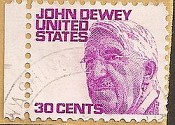
John Dewey (October 20, 1859 – June 1, 1952) was an American philosopher, psychologist, and educational reformer whose ideas have been very influential. Dewey, along with Charles Sanders Peirce and William James, is recognized as one of the founders of the philosophy of pragmatism and of functional psychology. He was a major representative of the progressive and progressive populist[1] philosophies of schooling during the first half of the 20th century in the USA.[2] Although Dewey is known best for his publications concerning education, he also wrote about many other topics, including experience and nature, art and experience, logic and inquiry, democracy, and ethics. In his advocacy of democracy, Dewey considered two fundamental elements—schools and civil society—as being major topics needing attention and reconstruction to encourage experimental intelligence and plurality. Dewey asserted that complete democracy was to be obtained not just by extending voting rights but also by ensuring that there exists a fully-formed public opinion, accomplished by effective communication among citizens, experts, and politicians, with the latter being accountable for the policies they adopt. Dewey was born in Burlington, Vermont of modest family origins.[3] Like his older brother, Davis Rich Dewey, he attended the University of Vermont, from which he graduated (Phi Beta Kappa)[4] in 1879. After three years as a high school teacher in Oil City, Pennsylvania, Dewey decided that he was unsuited for employment in primary or secondary education. After studying one year under G. Stanley Hall, working in the first American laboratory of psychology, Dewey received his Ph.D. from the School of Arts & Sciences at Johns Hopkins University. In 1884, he accepted a faculty position at the University of Michigan (1884-1888 and 1889-1894) with the help of George Sylvester Morris. His unpublished and now lost dissertation was titled "The Psychology of Kant". In 1894 Dewey joined the newly founded University of Chicago (1894-1904) where he developed his belief in an empirically based theory of knowledge, becoming associated with the newly emerging Pragmatic philosophy. His time at the University of Chicago resulted in four essays collectively entitled Thought and its Subject-Matter which was published with collected works from his colleagues at Chicago under the collective title Studies in Logical Theory (1903). During this time Dewey also initiated the University of Chicago Laboratory Schools where he was able to actualize his pedagogical beliefs which provided material for his first major work on education, The School and Society (1899). Disagreements with the administration ultimately caused his resignation from the University, and soon thereafter he relocated near the East Coast. In 1899, John Dewey was elected president of the American Psychological Association. From 1904 until his death he was professor of philosophy at both Columbia University and Columbia University's Teachers College.[5] In 1905 he became president of the American Philosophical Association. He was a long-time member of the American Federation of Teachers. Along with the historian Charles Beard, economists Thorstein Veblen and James Harvey Robinson, Dewey is one of the founders of The New School for Social Research. Dewey's most significant writings were "The Reflex Arc Concept in Psychology" (1896), a critique of a standard psychological concept and the basis of all his further work; Democracy and Education (1916), his celebrated work on progressive education; Human Nature and Conduct (1922), a study of the function of habit in human behavior; The Public and its Problems (1927), a defense of democracy written in response to Walter Lippmann's The Phantom Public (1925); Experience and Nature (1925), Dewey's most "metaphysical" statement; Art as Experience (1934), Dewey's major work on aesthetics; A Common Faith (1934), a humanistic study of religion, which was originally delivered as the Dwight H. Terry Lectureship at Yale; Logic: The Theory of Inquiry (1938), an examination of Dewey's unusual conception of logic; Freedom and Culture (1939), a political work examining the roots of fascism; and Knowing and the Known (1949), a book written in conjunction with Arthur F. Bentley that systematically outlines the concept of trans-action which is central to his other works. While each of these works focuses on one particular philosophical theme, Dewey included his major themes in most of what he published. His professional life was extremely productive and included more than 700 articles in 140 journals, and approximately 40 books. Dewey married twice, first with Alice Chipman. They had six children.[6] His second wife was Roberta Lowitz Grant.[7] At University of Michigan, Dewey published his first two books, Psychology (1887), and Leibniz's New Essays Concerning the Human Understanding (1888), both of which expressed Dewey's early commitment to Hegelian idealism. Psychology explored the synthesis between this idealism and experimental science that Dewey was then attempting to effect.[8] While still professor of philosophy at Michigan, Dewey and his junior colleagues, James Hayden Tufts and George Herbert Mead, together with his student James Rowland Angell, all influenced strongly by the recent publication of William James' Principles of Psychology (1890), began to reformulate psychology, emphasizing the social environment and on the activity of mind and behaviour rather than the physiological psychology of Wundt and his followers. By 1894, Dewey had joined Tufts, with whom he would later write Ethics (1908), at the newly-founded University of Chicago and invited Mead and Angell to follow him, the four men forming the basis of the so-called "Chicago group" of psychology. Their new style of psychology, later dubbed functional psychology, had a practical emphasis on action and application. In Dewey's article "The Reflex Arc Concept in Psychology" which appeared in Psychological Review in 1896, he reasons against the traditional stimulus-response understanding of the reflex arc in favor of a "circular" account in which what serves as "stimulus" and what as "response" depends on how one considers the situation, and defends the unitary nature of the sensory motor circuit. While he does not deny the existence of stimulus, sensation, and response, he disagreed that they were separate, juxtaposed events happening like links in a chain. He developed the idea that there is a coordination by which the stimulation is enriched by the results of previous experiences. The response is modulated by sensorial experience. Dewey, not without polemic, was elected president of the American Psychological Association in 1899. In 1984, the American Psychological Association announced that Lillian Moller Gilbreth (1878-1972) had become the first psychologist to be commemorated on a United States postage stamp. However, psychologists Gary Brucato Jr. and John D. Hogan later made the case that this distinction actually belonged to John Dewey, who had been celebrated on an American stamp 17 years earlier. While some psychology historians consider Dewey more of a philosopher than a bona fide psychologist,[9] the authors noted that Dewey was a founding member of the A.P.A., served as the A.P.A.'s eighth President in 1899, and was the author of an 1896 article on the reflex arc which is now considered a basis of American functional psychology.[10] Dewey also expressed interest in work in the psychology of visual perception performed by Dartmouth research professor Adelbert Ames, Jr. He had great trouble with listening, however, because it is known Dewey could not distinguish musical pitches - in other words was tone deaf[11]. Although Dewey did not identify himself as a pragmatist per se, but instead referred to his philosophy as "instrumentalism", he is considered one of the three major figures in American pragmatism, along with Charles Sanders Peirce, who invented the term, and William James, who popularized it. Dewey worked from strongly Hegelian influences, unlike James, whose intellectual lineage was primarily British, drawing particularly on empiricist and utilitarian ideas.[12] Neither was Dewey so pluralist or relativist as James. He stated that value was a function not of whim nor purely of social construction, but a quality situated in events ("nature itself is wistful and pathetic, turbulent and passionate" (Experience and Nature)). He also stated that experimentation (social, cultural, technological, philosophical) could be used as an approximate arbiter of truth. For example, James felt that for many people who lacked "over-belief" of religious concepts, human life was superficial and rather uninteresting, and that while no one religious belief could be demonstrated as the correct one, we are all responsible for making a gamble on one or another theism, atheism, monism, etc. Dewey, in contrast, while honoring the important function that religious institutions and practices played in human life, rejected belief in any static ideal, such as a theistic God. Dewey felt that only scientific method could reliably increase human good. Of the idea of God, Dewey said, "it denotes the unity of all ideal ends arousing us to desire and actions."[13] As with the reemergence of progressive philosophy of education, Dewey's contributions to philosophy as such (he was, after all, much more a professional philosopher than an educator) have also reemerged with the reassessment of pragmatism, beginning in the late 1970s, by philosophers like Richard Rorty, Richard J. Bernstein and Hans Joas. Because of his process-oriented and sociologically conscious opinion of the world and knowledge, his ideology is considered sometimes as a useful alternative to both modern and postmodern ideology. Dewey's non-foundational method pre-dates postmodernism by more than half a century. Recent exponents (like Rorty) have not always remained faithful to Dewey's original ideas, though this itself is completely consistent with Dewey's own usage of other writers and with his own philosophy— for Dewey, past doctrines always require reconstruction in order to remain useful for the present time.
do you like this author?
What readers are saying
What do you think? Write your own comment on this book!
write a commentWhat readers are saying
What do you think? Write your own comment on this author!
write a commentBook list

China,Japan and the U.S.A.
Present-Day Conditions in the Far East and Their Bearing on the Washington Conference
Series:
Unknown
Year:
Unknown
Raiting:
4/5
Show more
add to favoritesadd In favorites
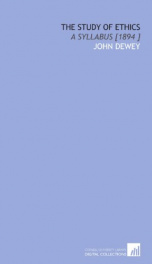
the study of ethics a syllabus
Series:
Unknown
Year:
Unknown
Raiting:
2.5/5
Originally published in 1894. This volume from the Cornell University Library's print collections was scanned on an APT BookScan and converted to JPG 2000 format by Kirtas Technologies. All titles scanned cover to cover and pages may include marks notations and other marginalia present in the original volume.
Show more
add to favoritesadd In favorites
Book list

China,Japan and the U.S.A.
Present-Day Conditions in the Far East and Their Bearing on the Washington Conference
Series:
Unknown
Year:
Unknown
Raiting:
4/5
Show more
add to favoritesadd In favorites

the study of ethics a syllabus
Series:
Unknown
Year:
Unknown
Raiting:
2.5/5
Originally published in 1894. This volume from the Cornell University Library's print collections was scanned on an APT BookScan and converted to JPG 2000 format by Kirtas Technologies. All titles scanned cover to cover and pages may include marks notations and other marginalia present in the original volume.
Show more
add to favoritesadd In favorites

the psychology of drawing imagination and expressionculture and industry in ed
Series:
Unknown
Year:
Unknown
Raiting:
4.5/5
Show more
add to favoritesadd In favorites
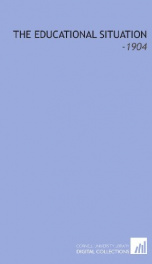
the educational situation
Series:
Unknown
Year:
Unknown
Raiting:
1/5
Originally published in 1904. This volume from the Cornell University Library's print collections was scanned on an APT BookScan and converted to JPG 2000 format by Kirtas Technologies. All titles scanned cover to cover and pages may include marks notations and other marginalia present in the original volume.
Show more
add to favoritesadd In favorites

studies in logical theory
Series:
Unknown
Year:
Unknown
Raiting:
4.5/5
Originally published in 1911, 1906. This volume from the Cornell University Library's print collections was scanned on an APT BookScan and converted to JPG 2000 format by Kirtas Technologies. All titles scanned cover to cover and pages may include marks, notations and other marginalia present in the original volume. --This text refers to an alternate Paperback edition.
Show more
add to favoritesadd In favorites
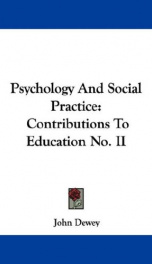
psychology and social practice
Series:
Unknown
Year:
Unknown
Raiting:
3/5
This scarce antiquarian book is included in our special Legacy Reprint Series. In the interest of creating a more extensive selection of rare historical book reprints, we have chosen to reproduce this title even though it may possibly have occasional imperfections such as missing and blurred pages, missing text, poor pictures, markings, dark backgrounds and other reproduction issues beyond our control. Because this work is culturally important, we have made it available as a part of our commitment to protecting, preserving and promoting the world's literature.
Show more
add to favoritesadd In favorites
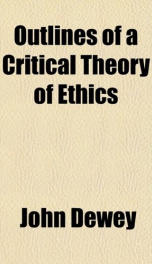
outlines of a critical theory of ethics
Series:
Unknown
Year:
Unknown
Raiting:
3.5/5
Purchase of this book includes free trial access to www.million-books.com where you can read more than a million books for free. This is an OCR edition with typos. Excerpt from book: Chapter II.THE IDEA OF OBLIGATION. XLII. Theories Regarding The idea of obligation Moral Authority, or duty has two sides. There is the idea of law, of something which controls conduct, and there is the consciousness of the necessity of conforming to this law. There is, of course, no separation between the two sides, but the consideration of the latter sidethe recognition of obligationmay be best dealt with in discussing conscience. Here we shall deal simply with the fact that there is such a thing in conduct as law controlling action, and constituting obligation. Theories regarding obligation may, for our purposes, be subdivided into those which make its exercise restraint or coercion (and which therefore hold that in perfect moral conduct, duty as such disappears); and those which hold that obligation is a normal element in conduct as such, and that it is not, essentially, but only under certain circumstances, coercive. Of the former type, some theories (mainly the hedonistic) regard the restraint as originally imposed from without upon the desires of the individual, while others (as the Kantian) regard it as imposed by man's reason upon his desires and inclinations. XLIII. Bain's It is obvious that the question Theory of of obligation presents considerable Obligation, difficulty to the hedonistic school. If the end of conduct is pleasure, as the satisfaction of desire, why should not each desire be satisfied, if possible, as it arises, and thus pleasure secured? What meaning is there in the term ' duty' or ' obligation' if the moral end or good coincides wholly with the natural end of the inclinations themselves ? It is evident, at all events, that the term can have significance only if there is some cause preventing the desires as they arise from natural sati...
Show more
add to favoritesadd In favorites

logical conditions of a scientific treatment of morality
Series:
Unknown
Year:
Unknown
Raiting:
5/5
Show more
add to favoritesadd In favorites

letters from china and japan
Series:
Unknown
Year:
Unknown
Raiting:
4/5
Originally published in 1921. This volume from the Cornell University Library's print collections was scanned on an APT BookScan and converted to JPG 2000 format by Kirtas Technologies. All titles scanned cover to cover and pages may include marks, notations and other marginalia present in the original volume.
Show more
add to favoritesadd In favorites

human nature and conduct an introduction to social psychology
Series:
Unknown
Year:
Unknown
Raiting:
3.5/5
Show more
add to favoritesadd In favorites
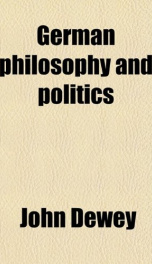
german philosophy and politics
Series:
Unknown
Year:
Unknown
Raiting:
4.5/5
Purchase of this book includes free trial access to www.million-books.com where you can read more than a million books for free. This is an OCR edition with typos. Excerpt from book: III THE GERMANIC PHILOSOPHY OF HISTORY The unity of the German people longed for and dreamed of after 1807 became an established fact through the war of 1870 with France. It is easy to assign symbolic significance to this fact. Ever since the time of the French Revolutionif not beforeGerman thought has taken shape in conflict with ideas that were characteristically French and in sharp and conscious antithesis to them. Rousseau's deification of Nature was the occasion for the development of the conception of Culture. His condemnation of science and art as socially corrupting and socially divisive worked across the Rhine to produce the notion that science and art are the forces which moralize and unify humanity. The cosmopolitanism of the French Enlightenment was transformed by German thinkers into a self-conscious assertion of nationalism. The abstract Rights of Man of the French Revolution were set in antithesis to the principle of the rights of the citizen secured to him solely by the power of the politically organized nation. The deliberate breach of the revolutionary philosophy with the past, the attempt (foreshadowed in the philosophy of Descartes) to make a tabula rasa of the fortuitous assemblage of traditions and institutions which history offers, in order to substitute a social structure built upon Reason, was envisaged as the fans et origo of all evil. That history is itself incarnate reason; that history is infinitely more rational than the formal abstracting and generalizing reason of individuals; that individual mind becomes rational only through the absorption and assimilation of the universal reason embodied in historic institutions and historic development, became the articles of faith of the German intellectual creed. It is hardly an exaggeration to say th...
Show more
add to favoritesadd In favorites

creative intelligence essays in the pragmatic attitude
Series:
Unknown
Year:
Unknown
Raiting:
3.5/5
This scarce antiquarian book is included in our special Legacy Reprint Series. In the interest of creating a more extensive selection of rare historical book reprints, we have chosen to reproduce this title even though it may possibly have occasional imperfections such as missing and blurred pages, missing text, poor pictures, markings, dark backgrounds and other reproduction issues beyond our control. Because this work is culturally important, we have made it available as a part of our commitment to protecting, preserving and promoting the world's literature. --This text refers to the Paperback edition.
Show more
add to favoritesadd In favorites
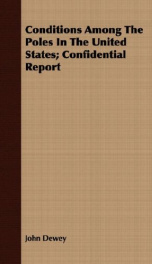
conditions among the poles in the united states confidential report
Series:
Unknown
Year:
Unknown
Raiting:
4/5
CONTENTS . Introduction . . . . . . . Occasion of Report . . . . . . . . . . . . . Sourcesoflnformation . . . . . . . . . . . . . General I3uropean Conditions. as Affect. ing the Poles in the 1-nited States European Developments during the War . . . . . . . . . Relativt to Russia hcforc the Itevolution . . . . . . . . Kclative to Austria . . . . . . . . . . . . . . Effect of the Ilnssian 1 evolut. ion . . . . . . . . . . Effect of President 7ilsons T ccalaration of . January 22, 1917 . . Lhe Ger nnrlO ccr pt iiotnl. c o uncbil of Statc ndth r Rcgenq . The Inris Iorn nittceti nt1 its Polici s . . . . . . . . . . The Sational Denlocratic Party . . . . . . . . . . . Forination of tlle Iaris Comniittee . . . . . . . . . . Corn ositiono f tlic Iaris Porrr nittec . . . . . . . . . Jolish Cor tliiions in ttic I. nitc d St tcls . . . . . . . . . Charactcr of Iopulat ion . . . . . . . . . . . . . Organiztttion among Arnerican Poles . . . . . . . . . Firla lcial . . . . . . . . . . . . . . . . Clerical . . . . . . . . . . . . . . . . Political . . . . . . . . . . . . . . . . Chief Orga rizations . . . . . . . . . . . . . . let. h od of U lclerstandinga nd Interpreting Iolish onclitions in ille I-nited States . . . . . . . . . . . . . . . onclusions . . . . . . . . . . . . . . . . . . The Iletroit Convent. i on . . . . . . . . . . . . . . The 0t jects of t. hc Convention . . . . . . . . . . . The Cont. rol of the Conventio l . . . . . . . . . . . Decisions of the Convention . . . . . . . . . . . . Specific Points of Friction and Discord . . . . . . . . . . Personal . . . . . . . . . . . . . . . . . Financial Matters, Relief Funds, etc . . . . . . . . . . The Ihite Cross and the Red Cross . . . . . . . . . The Polish Army . . . . . . . . . . . . . . . Polish Publicity in the United States . . . . . . . . General Conclusions . . . . . . . . . . . . . . . .
Show more
add to favoritesadd In favorites
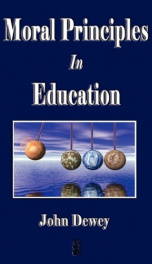
Moral Principles in Education
Series:
Unknown
Year:
Unknown
Raiting:
1.5/5
Nothing can be more useful than for the public and the teaching profession to understand their respective functions. The teacher needs to understand public opinion and the social order, as much as the public needs to comprehend the nature of expert educational service. It will take time to draw the boundary lines that will be conducive to respect, restraint, and efficiency in those concerned; but a beginning can be made upon fundamental matters, and nothing so touches the foundations of our educational thought as a discussion of the moral principles in education.
By John Dewey (1859 –1952), an American philosopher, psychologist, and educational reformer whose ideas have been influential in education and social reform. He formed the basic principles of education, which defined tendency of many of pedagogical innovations of the twentieth century.
Show more
add to favoritesadd In favorites
By John Dewey (1859 –1952), an American philosopher, psychologist, and educational reformer whose ideas have been influential in education and social reform. He formed the basic principles of education, which defined tendency of many of pedagogical innovations of the twentieth century.
Show more
What readers are saying
What do you think? Write your own comment on this author!
write a commentGenre
- Books
- Books / History / Europe / Germany
- Literature & Fiction / Classics
- Nonfiction / Education
- Law
- Nonfiction / Education / Education Theory / Educational Psychology
- Religion & Spirituality / Christianity / Theology
- Nonfiction / Politics / International / Relations
- Reference / Atlases & Maps / World
- Books / Money
if you like Dewey John try:
readers also enjoyed
What readers are saying
What do you think? Write your own comment on this author!
write a commentGenre
- Books
- Books / History / Europe / Germany
- Literature & Fiction / Classics
- Nonfiction / Education
- Law
- Nonfiction / Education / Education Theory / Educational Psychology
- Religion & Spirituality / Christianity / Theology
- Nonfiction / Politics / International / Relations
- Reference / Atlases & Maps / World
- Books / Money
if you like Dewey John try:
readers also enjoyed
Do you want to read a book that interests you? It’s EASY!
Create an account and send a request for reading to other users on the Webpage of the book!

